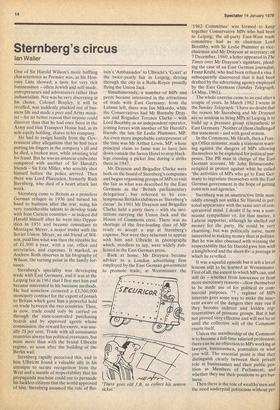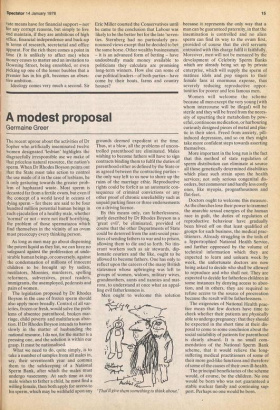Sternberg's circus
Ian Waller
One of Sir Harold Wilson's more baffling characteristics as Premier was, as his Honours Lists showed, a taste for very rich businessmen often Jewish and self-made, entrepreneurs and adventurers rather than industrialists. Nor was he very discerning in his choice. Colonel Brayley, it will be recalled, was suddenly plucked out of business life and made a peer and Army minister for no better reason that anyone could discover than that he had once been in the Army and that Transport House had, as its sole equity holding, shares in his company.
He had to resign hastily from the Government after allegations that he had been putting his fingers in the company's till and he died, a broken man, while awaiting trial for fraud. But he was an amateur embezzler compared with another of Sir Harold's friends Sir Eric Miller, who sensibly shot himself before the police arrived. Then there was Lord Plurenden, formerly Rudi Sternberg, who died of a heart attack last week.
Sternberg came to Britain as a penniless German refugee in 1936 and turned his hand to business after the war, using his very considerable talents to develop trade with Iron Curtain countries as indeed did Harold himself after he went into Opposition in 1951 and became consultant to Montague Meyer, a major trader with the Soviet Union. Meyer, an old friend of Wilson, paid him what was then the sizeable fee of £1,500 a year, with a car, office and secretaries, and expenses. It marked, as Andrew Roth observes in his biography of Wilson, the turning point in the family fortunes.
Sternberg's speciality was developing trade with East Germany, and it was at the Leipzig fair in 1961 that I first met him and became interested in his business methods. He had somehow cornered a £3,500,000 monopoly contract for the export of potash to Britain which gave him a powerful hold on trade between the two countries. Then, as now, trade could only be carried on through the state-controlled purchasing boards and by approved agents whose commission, the reward for entrée, was usually 2i per cent. Trade with all communist countries always has political overtones, but none more than with the brutal Ulbricht regime, so soon after the building of the Berlin wall.
Sternberg rapidly perceived this, and in him Ulbricht found a valuable ally in his attempts to secure recognition from the West and a mantle of respectability that his propaganda machine could use to persuade his luckless citizens that the world approved of him. Sternberg assumed the role of Bri
tain's 'Ambassador' to Ulbricht's 'Court' at the twice-yearly fair in Leipzig, driving through the city in a Rolls-Royce proudly flying the Union Jack.
Simultaneously, a number of MPs and peers became interested in the attractions of trade with East Germany: from the Labour left, there was Ian Mikardo, while the Conservatives had Mr Burnaby Drayson and Brigadier Terence Clarke with Lord Boothby as an independent operator, joining forces with another of Sir Harold's friends, the late Sir Leslie Plummer, MP. An even more improbable entrepreneur of the time was Mr Arthur Lewis, MP, whose principal claim to fame was to have lain down outside the Savoy Hotel to stop blacklegs crossing a picket line during a strike there in 1947.
Mr Drayson and Brigadier Clarke were both on the board of Sternberg's companies and began organising groups of MPs to visit the fair as what was described by the East Germans as the 'British parliamentary delegation', but referred to by contemptuous British exhibitors as 'Sternberg's circus'. In 1961 Mr Drayson and Brigadier Clarke held a party there with the invitations carrying the Union Jack and the House of Commons crest. There was no shortage of the free-loading class of MP ready to accept a trip at Sternberg's expense. Nor were they reluctant to appear with him and Ulbricht in photographs which, needless to say, were widely publicised in the East German press.
Back at home, Mr Drayson became adviser to a London advertising firm employed by the East German government to promote trade; at Westminster the
'1962 Committee' was formed to keep together Conservative MPs who had been to Leipzig; the all-party East-West trade committee had as its chairman Lord Boothby, with Sir Leslie Plummer as vicechairman and Mr Drayson as secretary; on 7 December, 1960, a letter appeared in The Times over Mr Drayson's signature, pleading the case of an East German journalist, Franz Krahl, who had been refused a visa. I subsequently discovered that it had been drafted by the advertising agency employed by the East Germans (Sunday Telegraph, 14 May, 1961).
The whole exercise came to an end after a couple of years. In March 1962 I wrote in the Sunday Telegraph: 'I have no doubt that the reason Mr Sternberg and Mr Drayson are so anxious to bring MPs to Leipzig is to build up a pressure group sympathetic to East Germany.' Neither of them challenged this statement and with good reason.
In the Commons, Mr Heath, then a Foreign Office minister, made a statement warning against the dangers of MPs allowing themselves to be exploited for political purposes. The PR man in charge of the East German account, Mr John Brimacombe, resigned in protest against what he called 'the activities of MPs who go to East Germany to ingratiate themselves with the East German government in the hope of getting contracts and agencies.'
Sternberg was an unattractive little man, oddly enough not unlike Sir Harold in personal appearance with the same sort of conspiratorial mind. I doubt if he was a communist sympathiser or, for that matter, a Labour supporter, although he shelled out money for the party. He could be very charming, but was politically naive, more interested in making money than in politics. But he was also obsessed with winning the respectability that Sir Harold gave him with a knighthood and the short-livci peerage in which he revelled.
It was a squalid episode but it left a lot of lessons still to be learned at Westminster. First of all, the extent to which MPs can, and still do whether from innocence or from more mercenary reasons allow themselves to be made use of for political or com mercial purposes. ... register of MPs interests goes some way to make the inno cent aware of the dangers they may run if they become indirect and hidden representatives of pressure groups. But it has not proved very effective and will not be so until the collective will of the Commons exerts itself.
Unless the membership of the Commons is to become a full-time salaried profession, there can be no objection to MPs working as lawyers, businessmen, journalists or what you will. The essential point is that they distinguish clearly between their private role as businessmen and their public position as Members of Parliament; and whether they use their positions to get business.
Then there is the role of wealthy'men and the need underpaid politicians without pri vate means have for financial support — not' for any corrupt reasons, but simply to live and maintain, if they are ambitious of high Office, financial independence and back-up in terms of research, secretarial and office apparat. For the rich there comes a point in time (it is unlikely to affect me) when money ceases to matter and an invitation to Downing Street, being ennobled, or even Picking up one of the lesser baubles that a Premier has in his gift, becomes an obsessive ambition.
Ideology comes very much a second. Sir
Eric Miller courted the Conservatives until he came to the conclusion that Labour was likely to be the better bet for the late 'seventies. Sternberg had no particularly pronounced views except that he decided to bet the same horse. Other wealthy businessmen — it is an advanced form of betting — have undoubtedly made money available to politicians they calculate are promising long-term winners. How else can some of our political leaders — of both parties — have come by their boats, farms and country houses?































 Previous page
Previous page